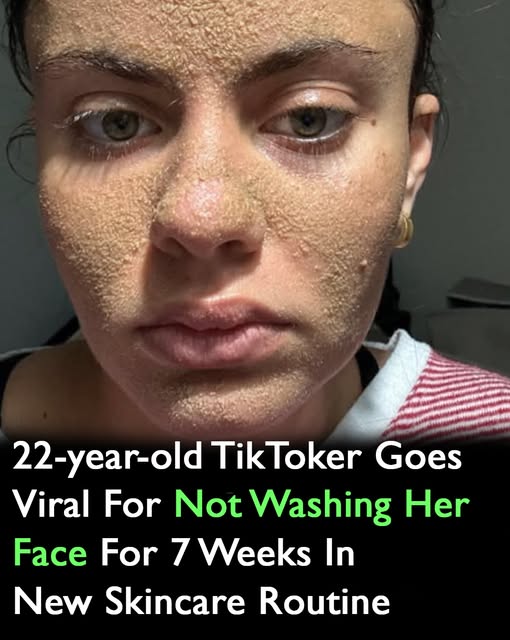Tia Zakher, a 22-year-old content creator on TikTok, has taken the internet by storm with a skincare decision that many would consider shocking. Unlike the countless influencers who promote 10-step skincare routines packed with cleansers, toners, moisturizers, and serums, Zakher chose a radically different path—she gave up skincare altogether. No products. No water. No touching her face. Nothing at all.

This “do-nothing” skincare approach, as she casually described it, ignited a wave of reactions from millions of viewers. Some praised her courage and curiosity, others accused her of faking her skin transformation, and many expressed genuine concern for her health and well-being. Her decision to ditch all skincare routines has sparked widespread discussion about modern beauty standards, the pressures of maintaining perfect skin, and how far people are willing to go to find a solution to their skin troubles.
Zakher’s unconventional skincare experiment started on March 14, after years of trying to manage persistent acne. Like many others, she had invested in all the conventional and even aggressive treatments available—chemical peels, exfoliators, expensive topical creams, microneedling sessions, and prescription products. Despite her efforts, nothing offered long-term relief. Instead, the more she tried, the more sensitive and reactive her skin seemed to become. She reached a point of pure frustration, and in that moment, she decided to stop everything cold turkey. Her new rule: do not touch your face—literally and figuratively.
This meant no washing, no applying anything, and no picking at blemishes. It was a full retreat from the modern skincare industry. For weeks, she kept this decision to herself, opting not to share it with her growing base of followers on TikTok, which had surpassed 125,000 people at the time. But by early April, changes in her skin’s appearance became noticeable. Her face showed signs of peeling, uneven tone, dryness, and a coarse texture—details that didn’t escape the scrutiny of her observant viewers. Her comment section lit up with questions and theories.
@tiazakher Replying to @purppanther ♬ original sound – tia zakher
Eventually, Zakher responded by posting a video explaining her unorthodox skincare journey. The video quickly went viral, accumulating over 10 million views and bringing her story into the spotlight. In the video, she calmly detailed her reasoning, explaining that she had reached a breaking point with skincare and wanted to see what would happen if she gave her skin the space and time to heal naturally. She described the approach as a form of “skin fasting,” inspired by something she read online known as the “caveman” regimen—a name that refers to a completely bare-bones, product-free lifestyle. Zakher was quick to clarify that she didn’t come up with the name herself but found it while researching skin-healing techniques that didn’t involve commercial products.
Her honesty, confidence, and vulnerability struck a chord with a wide range of viewers. Some were intrigued by the idea of trusting the body to repair itself without external intervention, while others felt uneasy watching someone publicly abandon skincare in favor of what seemed like an extreme method. The backlash was swift in some corners. Critics labeled her irresponsible, especially given her large audience, many of whom are young and impressionable. Skincare professionals chimed in, warning about the risks of allowing buildup of dirt, bacteria, and dead skin cells. Still, others applauded her courage for stepping outside the box and documenting a very personal experiment.
In the broader context of TikTok, where users frequently post about their skincare journeys, makeup routines, and even medical conditions, Zakher’s story resonates with a growing number of people who are beginning to question the constant pressure to maintain flawless skin. The beauty industry, with its endless parade of new products and miracle solutions, often leaves consumers overwhelmed, overspent, and still unhappy with their results. Zakher’s decision to walk away from all of it feels like a rebellion—a quiet protest against the idea that healthy skin always requires intervention.
In many ways, Zakher’s choice reflects a deeper trend among Gen Z content creators, who are increasingly favoring authenticity over perfection. Instead of filters and glossy product shots, they’re showing real skin, real struggles, and real results—whether good, bad, or somewhere in between. Zakher’s journey isn’t framed as a miracle cure or a one-size-fits-all approach. She’s not claiming to have discovered the answer to acne. Rather, she’s presenting a deeply personal experiment that might not work for everyone, but that helped her reclaim a sense of control over her own body.
Since her video went viral, Zakher has continued to document her journey, sharing updates about how her skin evolves over time. She’s also taken time to engage with both supporters and critics, answering questions and offering insights into her mental health and the psychological toll that years of battling acne took on her self-esteem. She acknowledges that what she’s doing might not be safe or practical for everyone, but for her, it was a necessary step toward healing—both physically and emotionally.
Ultimately, Zakher’s experiment raises important questions: How much do we really need to care for our skin? Is skincare a form of self-love, or has it become another form of pressure disguised as empowerment? And what happens when we stop trying to control every aspect of our appearance?
While dermatologists may continue to recommend tailored routines for skin types and concerns, Zakher’s story is a reminder that personal agency matters. For some, the best solution may still come in a bottle. For others, like Zakher, it may come from stepping back, letting go, and letting the body find its own rhythm. Her journey is less about flawless skin and more about learning to be at peace with imperfection. In a world obsessed with filters and fixes, that message might be exactly what many of her followers needed to hear.





